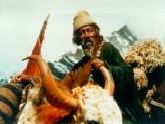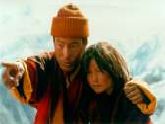

In 1999, Caravan was one of the movies nominated for Best Foreign Picture at the Academy Awards. It did not win, and nobody heard from it again. More than two years later, Himalaya arrives in theaters. The connection? They are the same movie. For whatever reason, the title change occurred. Both titles are anonymous enough to not attract people unless they know that the movie is about, and honestly, the former title is more fitting for the movie. Himalaya is about the struggle between the past and the future, and could take place now, or hundreds of years ago.
The villagers of Dolpo live in a secluded region in Nepal. In order to survive, they make a trek over the Himalayan mountains to trade salt for food. The trek is long and arduous, and it is the job of the hardiest man to lead the other men and yaks over the mountains. On the last trek, the leader died. The most obvious replacement is Karma (Gurgon Kyap), but village leader Tinle (Thilen Lhondup) vehemently objects. Generations ago, Karma's ancestors committed some unnamed crime, and Tinle believes that Karma still carries the guilt and is unfit to lead. When Tinle was younger, he used to lead the caravan, and it was his son that died. He wants his youngest son Pasang (Karma Wangel) to take over, but he is too young. The village thinks Karma is fit to lead, but Tinle's hold over them is strong.
Tinle vows to lead the caravan over Karma's objections. The tension comes between the Tinle and Karma, who represent both the old and the new, and tradition and pragmatism. Tinle is waiting for the day that is luckiest, while Karma sets off early because he does not want to waste time. Tinle leads his own caravan on the appointed day, vowing to catch up with Karma. Tinle binds his decision by his religion. He relies on luck and the gods to guide him. Karma is much more comfortable with common sense. Tinle also has much pride. He wants to prove that he can still lead the caravan and that his family has the ability to carry on. He even asks his second son, Norbou (Karma Tensing) to help. Norbou is a lama, and is in no way fit to lead a caravan.
Nothing really happens for a long time, and much of the story does not truly emerge until about halfway into the movie, but it is engrossing after that. Director Eric Valli and writers Nathalie Azoulai, Olivier Dazat (Night Shift), Louis Gardel (East-West), and Jean-Claude Guillebaud settle more for breathtaking vistas than substance for a large part of the film. The views are gorgeous. They quickly change from barren and dangerous to stunning. None of the people in the film are actors, leading to incredibly naturalistic performances. It's like watching people do what they normally do, only with cameras around them. Himalaya is not a complicated film, but one resounding with age-old themes.